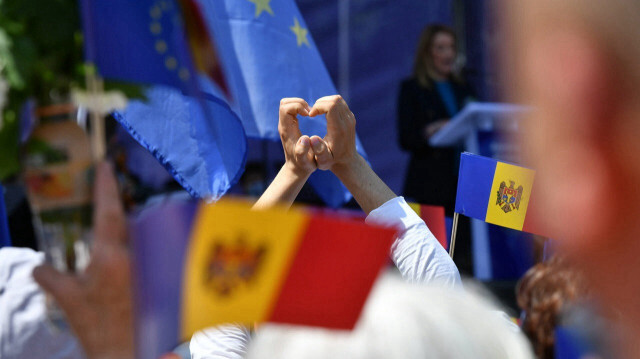

File photo
Moldova, a candidate country for EU membership, faces occasional political crises as it remains a battleground between West and Russia
As Moldova on Tuesday celebrates the 33rd anniversary of the independence it gained after the collapse of the Soviet Union, it continues to take steps toward becoming a member of the EU.
The parliament of Moldova, which seceded from the USSR, adopted a declaration of independence on Aug. 27, 1991.
After declaring its independence, the country turned its eyes to Europe and signed an association agreement with the EU in 1994.
The agreement entered into force in 1998 and was renewed in 2014, facilitating visa-free travel for Moldovan citizens to EU member states.
In Moldova, the process of rapprochement with the EU accelerated after the Action and Solidarity Party, founded by pro-Western President Maya Sandu, came to power in 2020.
Moldova applied for EU accession in March 2022 and was granted candidate country status. Thus, membership negotiations between the EU and Moldova started in June this year.
In the country, which is governed by a parliamentary system, a referendum on EU membership will be held in October along with the presidential election.
- Moldova as a battleground between Russia, West
Moldova, where both pro-Western and pro-Russian forces have come to power since its independence, has been a country that has experienced political crises from time to time.
Moldova joined the Commonwealth of Independent States in 1994 and became an observer country in the Eurasian Economic Union in 2014.
In 2009, protests were held in the country's parliamentary elections after the Party of Communists of Moldova, known for its Russian stance, came out ahead.
After the demonstrations in which it was claimed that the election was fraudulent, parliamentary elections were held and a pro-European coalition government was formed.
Following the parliamentary elections held in 2019, Moldova once again faced a political crisis. Although this crisis resulted in the formation of a coalition government by pro-Russian and pro-Western parties, the country held early parliamentary elections again in 2021.
- Relations with Russia
After the pro-Western parties came to power in Moldova four years ago, relations with Russia entered a period of crisis.
The Moldovan government, which supports Ukraine in the war against Russia, decided to block the websites of Russian-language media organizations on the grounds that they “spread information inciting hatred and war” and accused the Russian administration of threatening its security.
Russia, for its part, said Moldova was taking “unfriendly” steps against it and called on Chisinau to remain constitutionally neutral.
Most recently, Russia warned Moldova not to deploy the F-16 fighter jets on its territory that the West had given to Ukraine.
- Transnistria
During the period when the borders were redefined after the collapse of the USSR, Moldova was faced with the issue of the "Transnistria" region located on the eastern bank of the Dniester River, which declared its independence unilaterally with the support of Russia.
After the declaration of independence, armed clashes broke out between Moldova and Transnistria. These conflicts ended with a cease-fire on July 22, 1992, while the process of resolving the issue under the umbrella of the Organization for Security and Cooperation in Europe began in 1993.
Although Moldova considers this region as its territory, Transnistria, which has its own administration, parliament and army, wants to be recognized as a separate state.
Transnistria, which is not recognized by any UN member state, possesses Russian military units and the largest ammunition dump from World War II in the village of Kobasna, which is expected to be destroyed.
While the Moldovan administration has expressed occasionally that the Russian military troops should be removed from the region and this issue should be resolved peacefully, Russia has recently argued that this is Moldova's internal issue and has been refusing to resolve it.
On the other hand, the so-called administration of Transnistria, where approximately 220,000 Russian citizens live, decided in February to request protection from Russia against Chisinau's “pressures.”
- Gagauz Autonomous Region
The republic, which was declared on Aug. 19, 1990, by the Gagauz Turks living in the region called "Bucak" in the south of Moldova during the dissolution of the Soviet Union, was not recognized by any country and continued its existence for 4 years.
With Türkiye's mediation role, an agreement was reached between Chisinau and Comrat. Accordingly, the Gagauz Autonomous Region was established within the borders of the Republic of Moldova on Dec. 23, 1994.
The Gagauz Autonomous Region, which does not have territorial integrity, consists of the capital Comrat, three cities, Chadir Lunga and Valkanesh, and 27 villages.
The Christian Gagauz people from the Oghuz tribe still serve as an important link in the relations between Türkiye and Moldova, which have moved to the level of strategic partnership.
- Relations between Moldova and Türkiye
Türkiye established diplomatic relations with Moldova in 1992 after recognizing its independence on Dec. 16, 1991.
Always in favor of Moldova's territorial integrity, Türkiye has been implementing social and economic projects in the country through the Turkish Cooperation and Coordination Agency for more than 30 years.
Following Turkish President Recep Tayyip Erdogan's visits to Chisinau and Comrat in 2018, relations with Moldova gained momentum and reached the level of strategic partnership.
#Europe
#independence
#Moldova
#Russia
